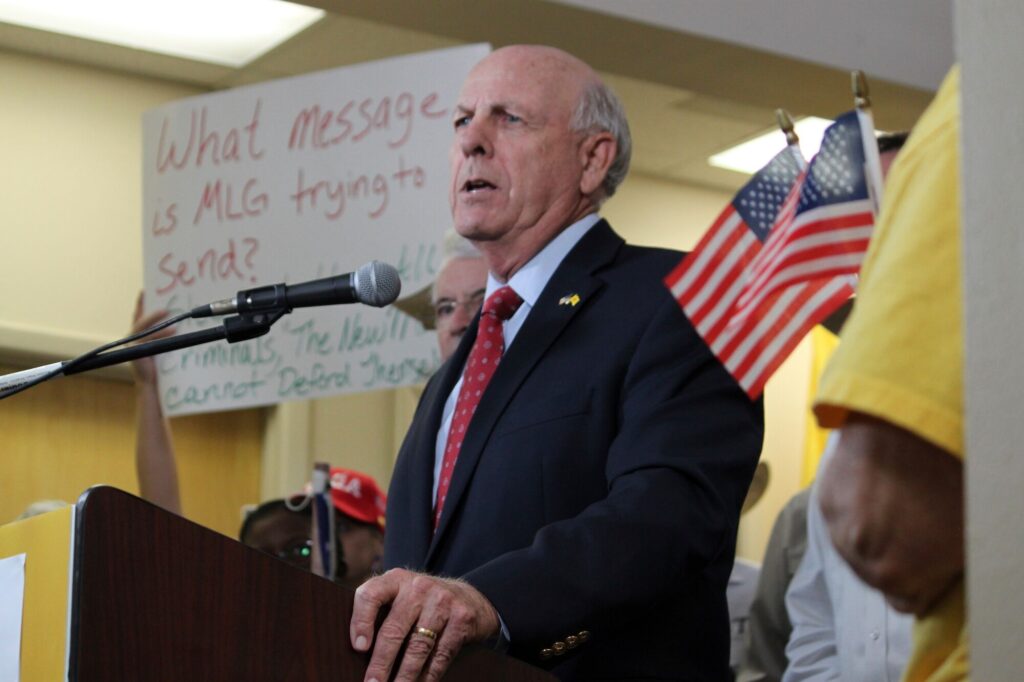Gardner claims ‘abuse of power’ in use of funds for Gitmo relocation
Colorado U.S. Sen. Cory Gardner and Republican colleagues Pat Roberts of Kansas and Tim Scott of South Carolina have asked the head of the Government Accountability Office for an opinion on whether the Department of Defense violated two federal laws by spending $25,909 in federal funds to survey potential sites to move Guantanamo Bay detainees to the United Sates.
Gardner and the other senators said the department spent the money studying sites in Colorado, Kansas and South Carolina, with the most money – $11,064 – surveying the “Supermax” facility in Florence. The Topeka Capital-Journal reported the department also spent $7,687 surveying Fort Leavenworth in Kansas and $7,158 to survey a Navy brig in Charleston, South Carolina. The money was spent on airfare and site surveys.
Nearly one year ago, Gardner sent a letter to President Obama that sought clarification of what legal authority the administration was using to conduct the assessments to move detainees from Guantanamo Bay to Colorado.
“The Obama administration’s use of federal funds to survey potential relocation sites for Guantanamo Bay detainees is in direct contradiction to current law,” Gardner said in a news release from his office. “This represents a blatant abuse of power and disregard for a law that President Obama himself signed.”
Gardner said his office had not received a response from Obama to the letter and pledged to “pursue all potential options available to hold the administration accountable for its illegal action, and continue to work to ensure that the terrorists in Guantanamo Bay stay in Cuba and out of our backyards.”
Obama: closure plan could save $85 million a year
Congressional opposition has so far kept Obama from fulfilling a 2008 campaign promise to close the Cuban prison for terrorism suspects.
In a Feb. 23, 2016, announcement of his plans to close the prison, Obama noted it had cost nearly $450 million last year to keep Gitmo open, and more than $200 million in other costs would be needed to continue to run the facility. Closing the prison is estimated to save $85 million a year and more than $300 million over 10 years, Obama said. Obama added his predecessor, Republican President George W. Bush, wanted to close the prison, as did Obama’s Republican opponent for president, Sen. John McCain of Arizona.
“And unfortunately, during that period where we were putting the pieces in place to close it, what had previously been bipartisan support suddenly became a partisan issue,” Obama said. “Suddenly, many (who) previously had said it should be closed backed off because they were worried about the politics. The public was scared into thinking that, well, if we close it, somehow we’ll be less safe. And since that time, Congress has repeatedly imposed restrictions aimed at preventing us from closing this facility.”
Obama added that despite the politics, more than 85 percent of the nearly 800 detainees once held at Guantanamo had been transferred to other countries. More than 500 of those transfers occurred under Bush, he noted. Through February of this year, 147 more inmates were transferred, leaving 91 detainees. Of those, 35 were approved for transfer, Obama said.
“As Congress has imposed restrictions that currently prevent the transfer of detainees to the United States, we recognize that this is going to be a challenge,” Obama added. “And we’re going to keep making the case to Congress that we can do this in a responsible and secure way, taking into account the lessons and great record of our maximum-security prisons.”
Obama admitted the politics are tough.
“I think a lot of the American public are worried about terrorism, and in their mind the notion of having terrorists held in the United States rather than in some distant place can be scary,” he said. “But part of my message to the American people here is we’re already holding a bunch of really dangerous (domestic) terrorists here in the United States because we threw the book at them. And there have been no incidents. We’ve managed it just fine.”
Gardner, Robert, Scott and other opponents also have concerns with the recidivism rate among released detainees, the hundreds of millions of dollars it will cost to build a new facility and that opening a domestic facility would place a “bullseye” for acts of terror on an American community.
Letter seeks opinion on legality of funds use
In their Sept. 28 letter to Gene Dodaro, comptroller general in the Government Accountability Office, Gardner and his colleagues claimed the expenditure of federal money to survey facilities in the three states violated the Consolidated Appropriations Act and National Defense Authorization Act. Both laws state that no appropriated funds are legally available for the relocation of Guantanamo Bay detainees to the United States, Gardner’s office said in a news release.
“Given that the DoD spent appropriated funds to survey potential relocation sites for Guantanamo detainees when no money was available for that purpose, we respectfully request your opinion as to whether the DoD violated the Consolidated Appropriations Act, 2016, and if so, whether the DoD also violated the Antideficiency Act …,” the letter reads.
Gardner’s efforts to block the transfer of Guantanamo Bay detainees have included an amendment to the Transportation, Housing and Urban Development and Related Agencies Appropriations Act that would prohibit the use of funds to transfer Guantanamo Bay detainees to the U.S. using our airspace. Gardner also introduced legislation to prevent the transfer or release of Guantanamo Bay detainees to global terror havens, including all countries designated by the State Department as state sponsors of terrorism. Those are now Iran, Syria and Sudan. U.S. law prohibits transfers to Yemen, Libya, Somalia, and Syria, but not to Iran and Sudan, where 14 detainees have been transferred over the past decade.
In March, Gardner introduced a resolution formally rejecting Obama’s plan to transfer prisoners from Guantanamo Bay to an alternate site in American communities. Gardner is also a co-sponsor of the Naval Station Guantanamo Bay Protection Act, a bill that stops the president from terminating or modifying Guantanamo Bay’s lease without Congressional approval.
Gardner has met with Coloradans and officials across the state who oppose moving terrorists from Guantanamo Bay to the U.S. Earlier this year, Gardner hosted a meeting in Florence, attended by local elected officials, law enforcement officials and other local leaders, where the potential transfer of Guantanamo Bay detainees to Colorado and the growing instability in the Middle East was discussed. Gardner also talked about his visit to the Guantanamo Bay detention facility and reiterated his opposition to the transfer of the detainees to American soil.












